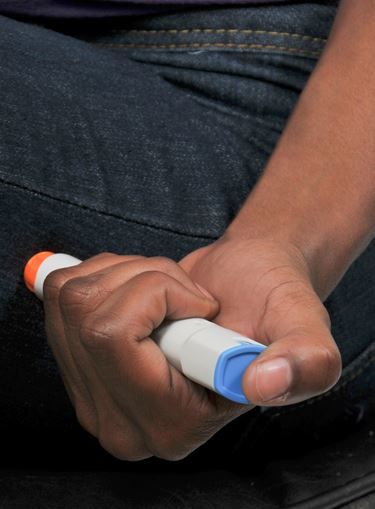- Clinical Technology
- Adult Immunization
- Hepatology
- Pediatric Immunization
- Screening
- Psychiatry
- Allergy
- Women's Health
- Cardiology
- Pediatrics
- Dermatology
- Endocrinology
- Pain Management
- Gastroenterology
- Infectious Disease
- Obesity Medicine
- Rheumatology
- Nephrology
- Neurology
- Pulmonology
Needle-free Epinephrine Delivery: Perceptions of Physicians, Patients, and Caregivers
AAAAI 2024. Needle phobia is just one of the barriers to not just using an epinephrine autoinjector but to carrying one at all, according to 2 sets of surveys findings.
Two-thirds of physicians indicate concern that individuals with food allergy at risk for an anaphylactic reaction and their caregivers do not fully recognize the importance of carrying injectable epinephrine at all times, as directed by a medical professional.1 More than half agree that needle phobia and the pain associated with the injection has led both the allergic individual and caregivers to avoid needle-injectors.
©Rob Byron/stock.adobe.com

The findings come from a survey of health care professionals1 that included allergists (150), pediatricians (90), and primary care physicians (75) and were presented at the 2024 American Academy of Allergy, Asthma, and Immunology (AAAAI) annual meeting, held February 23-26, 2024, in Washington, DC.
Intramuscular injection of epinephrine can reverse anaphylactic symptoms and prevent mortality and yet concerns about injections, needle phobia, and poor user education, among other barriers, limit not just proper use of a needle-injector but even carrying the device as directed, presenting author Autumn Burnette, MD, of Howard University Hospital, in Washington, DC, and colleagues wrote in the study abstract.
The research team used a 30-minute double-blinded survey to gain a better understanding of the obstacles to carrying/use of and unmet needs related to the epinephrine injectors, asking survey participants about perceptions of current treatment held by their at-risk patients and their caregivers.
In addition to the results noted above, Burnette and colleagues reported:
- 86% agreed patients would prefer a needle-free means of delivering epinephrine
- 79% agreed that needle-free epinephrine would lead to more people carrying a device
- 90% agreed that patients/caregivers will be more likely to use it
- 86% agreed patients/ caregivers would likely use a needle-free delivery device faster.
- 62% of physicians would prescribe a needle-free epinephrine for 50% or more of their patients
Advantages, according to the respondents, are being needle-free, ease of administration, and better portability of the device.
Burnette and coinvestigators reiterate their concern that epinephrine is underused and point to needle phobia as a primary impediment to the life-saving treatment during an allergy emergency. “This leads to significant delays in needed treatment and more severe patient outcomes. Having a needle-free option may help address many of the barriers patients currently experience with the injectable devices,” they concluded.1
Willingness to carry and QoL2
Another study in a similar vein presented at AAAAI assessed the potential effect of the availability of an intranasal, ie, needle-free, epinephrine device on quality of life for individuals with food allergy and their caregivers. Investigators were primarily interested in whether a needle-free option to deliver epinephrine would increase the willingness to carry a device and reduce the anxiety associated with living with food allergy.
In march 2023 presenting author Raffi Tachdjian, MD MPH, of the David Geffen School of Medicine at the University of California Los Angeles, and colleagues administered the Food Allergy Quality of Life Questionnaire (FAQLQ) in a double-blind manner to 240 individuals aged 18 to 55 years and 240 caregivers of children aged 5-17 years diagnosed with food allergy. They readministered the FAQLQ in July 2023 after participants had received information about an intranasal epinephrine delivery device.
Tachdjian and coauthors reported that 68% of respondents felt food allergy had a negative impact on their quality of life. Having reviewed the information about the intranasal epinephrine device:
- 75% of those interviewed were likely to ask their physician about it
- 65% agreed they were more likely to carry the device than an epinephrine autoinjector
- 80% felt this product would significantly benefit their quality of life
Persons with food allergy and those who care for them express quality of life concerns. The majority of a cohort of survey participants from that population responded positively to the concept of needle-free (intranasal) epinephrine delivery device and indicated they would be likely to carry it with them. “In addition, the majority of food allergy patients and caregivers anticipate the needle-free device will significantly improve their quality of life,” the authors concluded in the abstract.
